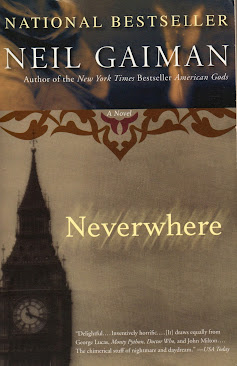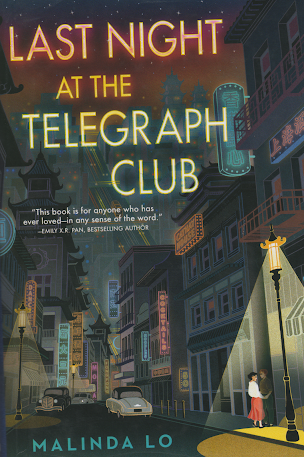It oughta be a movie: Neverwhere, by Neil Gaiman
Given the growing popularity of "urban fantasy", and the fact that multiple Neil Gaiman books have already been adapted for the screen, I'm quite surprised this is not one of them. 'Neverwhere' takes place in London - but the city we see, London Above is only half of it. London Below is a colorful, dangerous, fantastical place made up of lost pieces of the upper world and the people who fall through the cracks. London Below is inspired by intriguing place names in the city: there really is a small medieval court in Earl's Court, a convent of Black Friars, an Angel named Islington, and so on. It has its own politics and mysteries and conflicts...which one Upworlder, Richard Mayhew, finds himself caught up in.
Richard is seemingly an ordinary, even rather unimpressive, young man. He works in an office, has a tendency to forget things, and gets bossed around by his fiancé, Jessica. But he is kind, and he sees people. The book opens with him conversing with a homeless woman (well, to be fair, she had started the conversation because she thought that he was homeless), whom he gives an umbrella printed with the London tube map.
'You've got a good heart' she told him. 'Sometimes that's enough to see you safe wherever you go.' Then she shook her head. 'But mostly, it's not'.
Luckily, it turns out that Richard also has a surprising amount of backbone.
We meet Door, the eldest daughter of Lord Portico, as she is running through London Below. Her family has the talent of opening things; she is the last one left. In her desperation, Door opens one last passage, praying that she'll find someone who can help. She topples through a wall and onto the pavement almost at Richard's feet, as his fiancé is hurrying them toward a dinner with her boss.
'Jessica?' He could not believe that she was simply ignoring the figure at their feet...'Look'....'She's hurt.' He looked at his fingertips. 'She's bleeding.
Jessica wants to leave and/or call an ambulance, but Door insists she can't go to a hospital. So Richard picks her up, planning to take her home to patch her up. Jessica threatens to end their engagement if he does.
Richard felt the sticky warmth of blood soaking into his shirt. Sometimes, he realized there is nothing you can do. He walked away, leaving behind Jessica, who stood there on the sidewalk, her eyes stung with tears.
Door recovers surprisingly quickly, and with the aid of a pigeon and a rat and Richard gets a message to an ally, the marquis de Carabas - a dramatic, sarcastic, trickster of a man1. Richard's troubles, though, are just beginning. Door is being pursued by Mr. Croup and Mr. Vandermar, a pair of killers who are both utterly chilling and kind of hilarious. For example, when they show up at Richard's flat:
'I don't know what you think you're doing,' said Richard, 'But if you two don't get out of my apartment this minute, I'm phoning the police.' Then Mr. Vandemar...turned back toward Richard, and Richard suddenly realized that he had never been so scared of another human being in his life. And then foxy Mr. Croup said, "Why yes, whatever can have come over you, Mister Vandemar? It's grief for our dear sweet sibling, I'll wager, has turned his head. Now apologize to the gentleman, Mister Vandemar.' Mr. Vandemar nodded, and pondered for a moment. 'Thought I needed to use the toilet,' he said. 'Didn't. Sorry.'
Even more immediately alarming to him, however, is the fact that he seems to have become invisible. Taxis won't stop for him, tube machines won't take his coins, people's eyes - even Jessica's - slide right off him, and the apartment complex starts showing another couple around his flat while he is still there.
He realizes all this must have something to do with Door. The only person who can see him is a homeless man named Iliaster, who takes him to a group of people called the Ratspeakers2. A young girl, who also used to live in London Above - who might be called Anaesthesia, or might not - guides him most of the way to the Floating Market, but comes to grief along the way. At the market, he finds Door and the marquis, along with Hunter, a taciturn woman Door has just hired as a bodyguard. They are on a quest to find an angel, and Richard tags along in the hope that he might learn how to get his life back. But along the way they will have to face a Beast, and the treachery of one of their own.
I'm tagging this as a story with a female protagonist because although Richard is our main POV character, Door's decisions are as crucial as his to the plot - possibly more so. There is a nice reciprocity in their relationship. And it isn't a romance. Perhaps it might be, one day, but for the span of this story it is a partnership of another kind. Richard helps Door when she is most in need, and she refuses to abandon him when he is lost and out of his depth, even though the marquis points out that Richard seems like a liability. Door has the knowledge and magical skills of one born to London Below; Richard has the "beginner's mind" that can be a helpful element in solving problems. Neither would have succeeded in accomplishing their goals without the other.
1. He named himself after the false name Puss in Boots gives his human master, though he resembles Puss more than the farmboy.
2. As the name suggests, they speak to rats, which they revere, helping them accomplish things that small paws cannot.
Adaptation Issues:
One of the uncomfortable features of this book that I could see a movie studio lightening in favor of the other-world adventures is the glimpses of how real-world poor and homeless people are treated. That is: as invisible, or as objects of horror or pity. However, leaving that out would be a mistake, as it is very important to the story itself as well as its most relevant message. For instance, Jessica remarks when they find Door:
'If you pay them any attention, Richard, they'll walk all over you. They all have homes, really. Once she's slept it off, I'm sure she'll be fine.'
One of the biggest challenges Richard faces involves an ordeal in which he sees himself as others might very well be seeing him: a mentally ill bum who is hanging out on a subway platform just imagining all these adventures, a pathetic creature who would be better off dead. It is his connection to the people he has met, however, especially Anaesthesia - an actual homeless girl, remember, not someone who was born to London Below - that saves him. The theme almost gets dropped in the book toward the end, as the magical adventure needs to be wrapped up. Richard's friend Gary does gently point out that the people who society fails don't end up in a magical world; they freeze to death in the winter. However, there are some hints that suggest things could change, either for London Above, London Below, or both. For instance, Door's father had a dream of uniting the Underside - if she were to pursue that, what might it mean for the relationship between the worlds?
The characters in this story are as distinctive in looks as they are in personality, which would translate really well to the screen. Door is a pale, waifish figure with an auburn bob and "fire opal" eyes, dressed in layers of ripped silks and velvets topped with an oversize leather jacket. Vandemar and Croup are described as resembling a fox and a wolf - one small, red-haired, and clever, the other huge, grey-haired, and strong - and are dressed in "the kind of suits that might have been made by a tailor two hundred years ago who had had a modern suit described to him but had never actually seen one". Hunter has a definite 'Xena, warrior princess' vibe, being dressed in leather, tall and beautiful, with "tawny hair, and skin the color of burnt caramel" - and having a preference for women, though she is all business during their quest. As for the Marquis de Carabas:
He wore a huge dandyish black coat that was not quite a frock coat nor exactly a trench coat , and high black boots...His eyes burned white in an extremely dark face. And he grinned white teeth, momentarily, as if at private joke of his own.
Though Hunter and de Carabas' somewhat ambiguous ethnicities come off a bit as an aesthetic choice, their backgrounds not playing into the story explicitly, it would still be important not to white-wash them. London has been a diverse and cosmopolitan city for centuries, after all - why should London Below be any different? In fact, the background or secondary characters could stand to be diversified a bit. For instance, given that this is a version of London, and curry features prominently in the market stalls, there really ought to be more visible South Asian folk. Similarly, while Anaesthesia ended up in London Below after running away from an abusive stepfather, more details of how different characters "fell through the cracks" could be good to include. Given the prevalence of LGBT+ youth and people with disabilities in homeless populations, having more of the character designs hint at that - even if such subplots were not explicitly included - would strengthen the links between this fantasy story and real-world issues.
Finally, I don't know how this could be woven in to an adaptation, but there's a poem/dirge that gets referenced that I find quite haunting and which links so well to the story's message that it would be a shame to leave it out:
If ever thou gavest hosen or shoon3
Then every night and all
Sit thou down and put them on
And Christ receive thy soul
This aye night, this aye night
Every night and all
Fire and fleet and candlelight
And Christ receive thy soul
If ever thou gavest meat or drink
Then every night and all
The fire shall never make thee shrink
And Christ receive thy soul
(Lyke Wake Dirge)
Perhaps the Black Friars could chant it.
3. Archaic way of saying "hose" (leggings) and "shoes".



